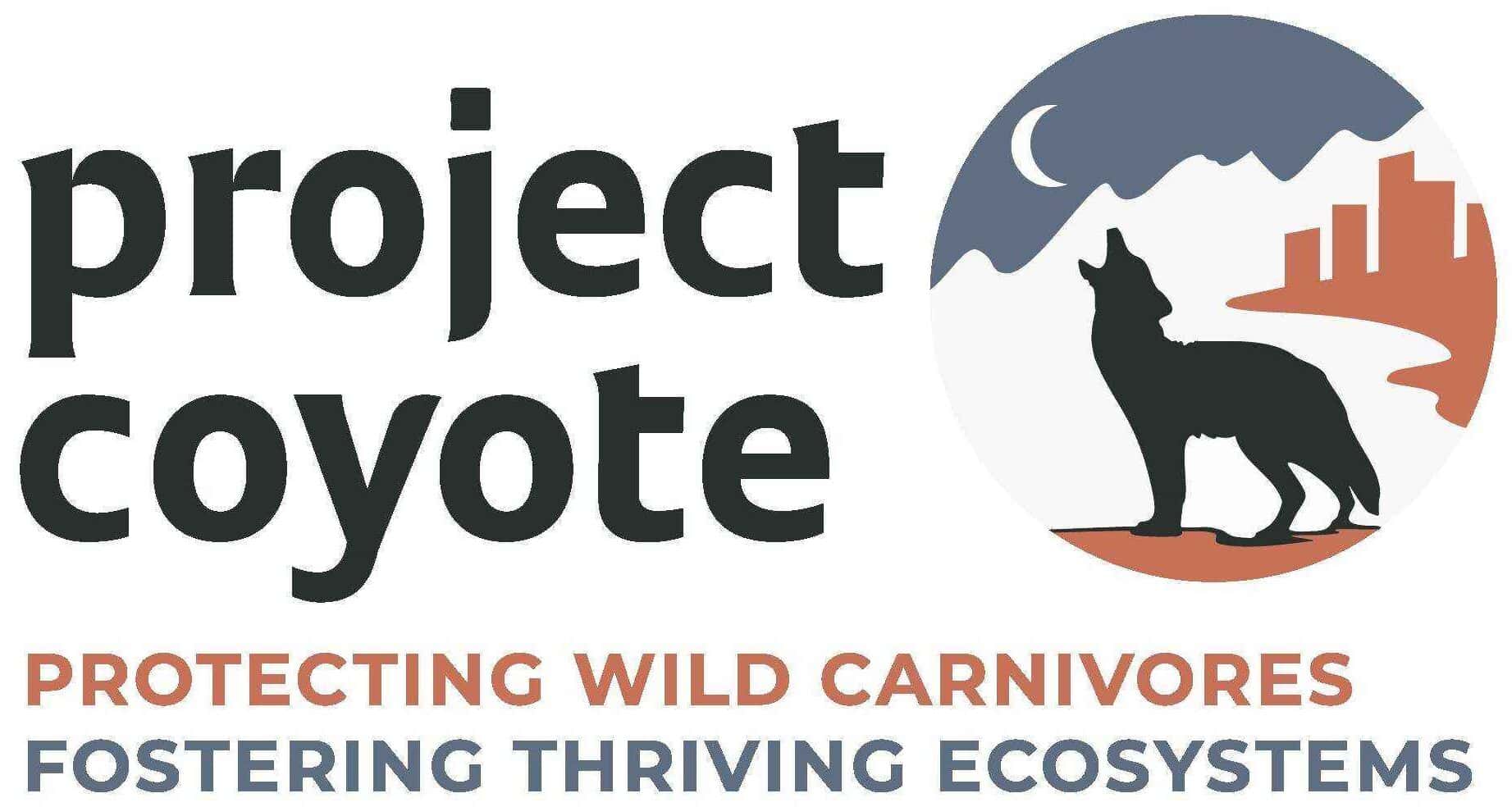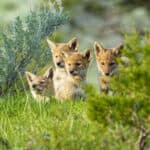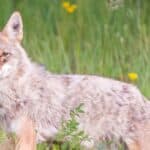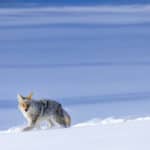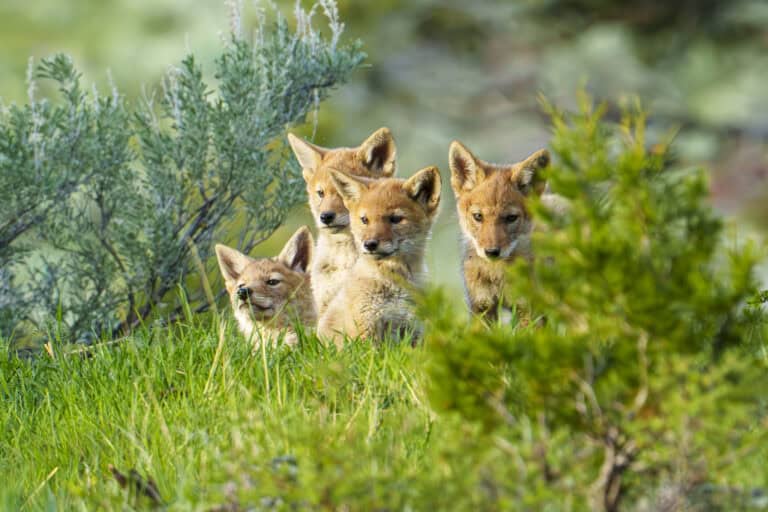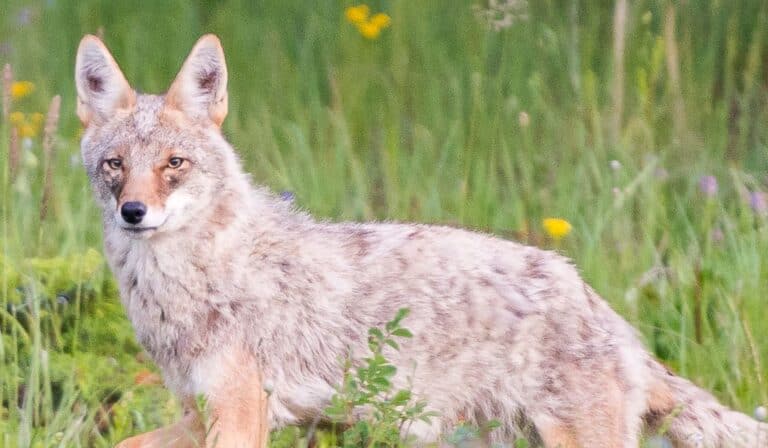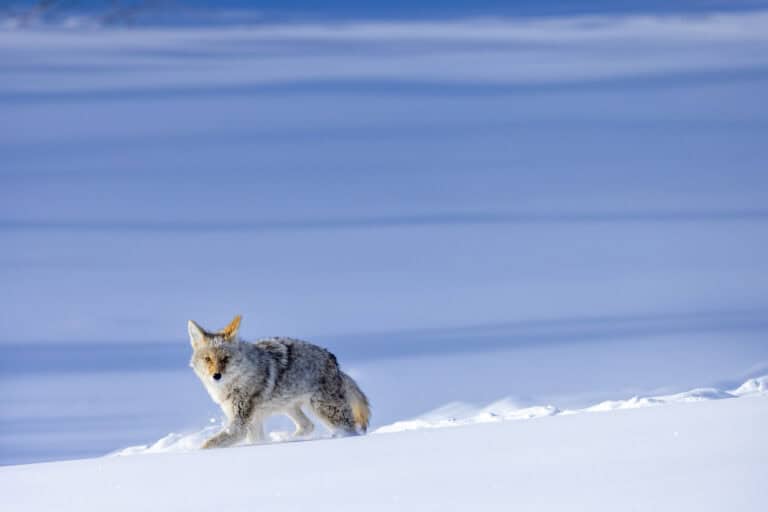We reached out to Project Coyote, an extraordinary organization based in California, with a powerful woman at the helm, Camilla Fox. Who is she and why coyotes? Since my first love as a wildlife photographer is to capture wolves, fox, coyote, in fact any carnivore, I was driven to find out. Since I was following a fox pack in my area, with a deep affection for the pack and its ability to survive, I thought it appropriate that I now learn about a woman who equally shared my love for carnivores. Millions of people view the coyote as a nuisance animal. Fear and loathing permeate the lives of farmers, ranchers and neighborhoods. Can anyone change anything or will coyotes always continue to be nothing more than a predator that we need to remove to maintain balance in our lives?

As Camilla explained, “growing up in a family environment where my father was a canid ethologist studying wild and domestic canid behavior, I was surrounded by lots of dogs, foxes, coyotes and wolves during my childhood and was fascinated by them. It really influenced me. As I grew older and started to work in the field of conservation, I saw that coyotes were the most persecuted, maligned and misunderstood native carnivore in the US. It was for that very reason, that I chose the coyote as our flagship species for Project Coyote.
We need to realize that coyotes are our very own unique native carnivore. Unlike foxes and wolves that live on other continents, coyotes only live in North America. Coyotes are iconic to the Western U.S. and are respected and revered by many Native American tribes as tricksters, creators, and ancestors. For so many important reasons, I chose the coyote to be our ambassador! We believe that if we can shift the way we view and treat our native “Song Dogs”, we can shift the way we view and treat other predators.”
“Prior to founding Project Coyote, I worked in the fields of animal and environmental protection for the last twenty years serving as Executive Director for the Fur-Bearer Defenders and in various leadership positions with the Rainforest Action Network and the Animal Protection Institute. I saw a need to bridge these two movements – conservation and animal protection – and to focus on promoting compassionate conservation and coexistence between people and wildlife – with Coyote as the iconic species that can help foster this collaborative bridge building. I also saw a need to partner with institutions, agencies, and city and county governments using a science-based approach to shift the emphasis away from killing toward coexistence.”
“Walk in kindness toward the Earth and every living being. Without kindness and compassion for all of Mother Nature’s creatures, there can be no true joy; no internal peace, no happiness. Happiness flows from caring for all sentient beings as if they were your own family, because in essence they are. We are all connected to each other and to the Earth.” ― Sylvia Dolson, Joy of Bears

Image Courtesy: Peggy Faranda for Project Coyote
Ecosystem Services: “As the excellent rodent controllers that they are, Coyotes (Canis latrans) mitigate disease transmission of hantavirus and other deadly diseases. They also serve to naturally limit species like skunks, raccoons, foxes, etc., through competition. In so doing, the presence of coyotes can benefit ground and song bird populations and diversity as mesocarnivores can take a heavy toll on bird eggs and nestlings. Moreover, as omnivores and scavengers coyotes help to keep ecosystems clean of carrion (dead things).”

Photo Courtesy: Sam Parks for Project Coyote
Re-“wilding” Coyotes: “Aversive conditioning or hazing has been applied to a number of species from black bears to coyotes. The idea is that with an animal that has become habituated, often by intentional or unintentional feeding, we need to “re-wild” them. The goal is to remove food attractants and the “welcome mat” and to keep coyotes wild and wary. This is actually more about modifying human behavior than animal behavior as it usually starts with educating people about how to mitigate negative encounters and how to understand coyote/animal behavior to avoid conflicts. Most of the time coyotes and other wild animals want to have nothing to do with us so hazing is not necessary. But it’s a good tool to use if needed in those rare circumstances that a wild animal has lost their natural wariness of people.
Re-wilding and hazing has been shown to be effective. In several US and Canadian cities, there are hazing techniques implemented for coyotes and bears. We have a Coyote Hazing Field Guide, available here: Project Coyote Field Hazing Guide. We freely provide our Guide to State or local agencies as well as to anyone who wants to learn how to keep these animals wild and wary.
“Earth provides enough to satisfy every man’s needs, but not every man’s greed.”― Mahatma Gandhi

Cinnamon Black Bear Photo Courtesy: Project Coyote
North America’s Native Song Dog and Persecution: “Project Coyote envisions a world where we recognize the critical ecological role of native predators like coyotes, wolves, mountain lions and bears and see their intrinsic value. Many Native American tribes recognized the relevance and importance of these species as reflected in their folklore. From tricksters to creators and ancestors, native predators were revered for their intelligence, adaptability and resilience. We need to keep that reverence and recognition alive and honor the critical aspects of not just predators but all wild animals.

Dead Coyote Photo: Courtesy Project Coyote
The coyote is the most persecuted native carnivore in North America. It’s estimated that a half a million coyotes are killed every year in the U.S —one per minute—by federal, state and local governments and by private individuals. The U.S. Department of Agriculture’s Wildlife Services program kills approximately 90,000 coyotes each year. Most of this killing is carried out in the name of “livestock protection” as a taxpayer subsidy for private sheep and cattle ranchers. Despite scientific evidence suggesting that this approach is misguided and ultimately ineffective, the emphasis on lethal coyote control persists. Coyotes are also killed for their fur, for “sport,” and in “body-count” contests where prizes are awarded for killing the most and/or largest coyotes. Most states set no limit on the number of coyotes that may be killed, nor do they regulate the killing method.”
“Here is your country. Cherish these natural wonders, cherish the natural resources, cherish the history and romance as a sacred heritage, for your children and your children’s children. Do not let selfish men or greedy interests skin your country of its beauty, its riches or its romance.”
― Theodore Roosevelt
Science and Education: “Project Coyote is a coalition of scientists, educators, predator friendly ranchers and citizen leaders providing a voice for native carnivores in wildlife management policy and promoting compassionate conservation and coexistence. We champion progressive management practices that reduce human-predator conflicts, support and contribute to innovative scientific research, and help foster respect for and understanding of coyotes, wolves, foxes and other native carnivores of North America. We accomplish our mission through Education, Science and Advocacy.”

Photo of Actor and Activist Peter Coyote and Project Coyote Founder Camilla Fox
As the only organization whose mission is to foster coexistence between people and wildlife and to advocate on behalf of America’s Song Dog and other native carnivores, Project Coyote fills a unique essential niche in the field of wildlife conservation. Since our founding in 2008, Project Coyote has become a leader in promoting compassionate conservation, providing both a centralized hub for science-based information and resources and a voice for coyotes and other persecuted native predators in policy forums. We seek to counter the myths and mistreatment of coyotes, wolves, foxes, bears, felids and other wild predators and to provide opportunities for collaboration, networking, and strategic policy change in how native carnivores are viewed and “managed.”
I do not think the measure of a civilization
is how tall its buildings of concrete are,
But rather how well its people have learned to relate
to their environment and fellow man.
~ Sun Bear of the Chippewa Tribe ~
We believe that coyotes, wolves and other native carnivores have much to offer us, not only by keeping ecosystems healthy, but by providing inspiring examples of ingenuity, adaptability and resilience in an ever-changing world.”

Photo Courtesy of Project Coyote
VICTORY FOR WILDLIFE!
On December 3rd, the California Fish and Game Commission voted 4 to 1 in support of a petition put forth by Project Coyote that closes the loopholes on wildlife killing contests where prizes are given to those who kill the most and the largest predators like coyotes, foxes and bobcats.
Wildlife conservationists hailed the vote as a victory for California’s wildlife. “We commend the commission for this enlightened decision and for setting a precedent for the nation,” said Camilla Fox Founder and Executive Director Project Coyote. “We should not be killing wildlife for fun and prizes in the 21st century.” “Wildlife prevailed at this historic meeting and the public made it clear through thousands of letters and thoughtful testimonies that they want to see predators protected in California,” Fox said. “We hope that this is a first step in reforming the state’s predator management regulations, policies, and codes,” Fox said
So what is your opinion now? Do you now believe they play an integral role in the balance of our ecosystem? What would you like to see changed? Do we want to continue to allow trophy and brutal cash for kill hunts in the US? Is this a legacy we leave to our children? Shoot, slaughter, ask questions later? Our earth, its resources and our fragile wildlife MUST matter. What can you do? Contact us at: editor@femworldview.com
Project Coyote is looking for more pack members! Visit their site and see how you can BE the difference: https://projectcoyote.org/action.html
Humankind has not woven the web of life.
We are but one thread within it.
Whatever we do to the web, we do to ourselves.
All things are bound together.
All things connect.
~ Chief Seattle, 1854 ~
